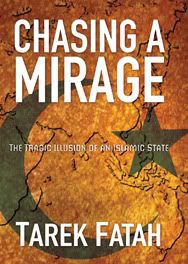Chasing A Mirage
Technorati tags: Books, Islam, Islamic State, Political Islam, Chasing A Mirage, Tarek Fatah
Some months back, Marina M. suggested that Walski add someone as his Facebook friend. That someone happens to be Tarek Fatah, who is the host for Canadian weekly TV show Muslim Chronicle, an activist, and a writer.
 His book Chasing A Mirage: The Tragic Illusion of an Islamic State, published last year, is a finalist for the Donner Prize, a Canadian literary prize awarded to writings that have impact on Canadian public policy.
His book Chasing A Mirage: The Tragic Illusion of an Islamic State, published last year, is a finalist for the Donner Prize, a Canadian literary prize awarded to writings that have impact on Canadian public policy.
The Globe And Mail recently featured the book, publishing the entire first chapter.
What’s compelling about Chasing A Mirage is that it attempts to debunk the myth that an Islamic State (read: Caliphate) is something that is necessary for Islam to flourish, and that is a “duty” for Muslims to pursue. It’s an idea that’s not rooted in the Quran or Hadith (sayings of the Prophet), but one that’s evolved over the centuries.
Since the first caliphate in Medina in the 7th century, clerics have continually reminded Muslims that their mission on Earth – to spread Islam – is impossible without the establishment of an Islamic State. Such edicts by caliphs and imams have gathered near-universal acceptance despite the fact that neither the Quran nor the Prophet asked Muslims to establish such a state. In fact, the five pillars of Islam, which form a Muslim's covenant with the Creator, do not even hint at the creation of an Islamic State.
(source: Chasing A Mirage, via The Globe and Mail)
The complete first chapter of Chasing A Mirage can be read here.
(the mirage, and the state of Islam vs. the Islamic state, in the full post)
In the last few decades, we’ve seen a growing resurgent call for the establishment of a global caliphate, through such organizations as the Hizb ut-Tahrir. There is a Malaysian chapter of this organization, too, who have been quite active in promoting the idea of a global caliphate. Many, however, see the movement as one that’s based on the glorification of an imagined past ideal, and using that ideal to forge the future. Similarly, there are critics of an Islamic State in itself.
Among the contemporary opponents of the Islamic State is the brilliant Sudanese-American academic, Professor Abdullahi An-Na'im, who teaches law at Emory University in Atlanta, Georgia. In his classic book, Toward an Islamic Reformation, An-Na'im writes about the unrealistic utopian dream of an Islamic State: “The authority of the caliph was supposed to be derived from popular support without any principle and mechanism by which that popular support could have been freely given, restricted, or withdrawn. This is, I maintain, one of the fundamental sources of constitutional problems with the sharia model of an Islamic state.” It is no wonder Muslims like An-Na'im are the prime targets of the Islamic religious right. Islamists consider secular, liberal, progressive, or cultural Muslims and even orthodox Sufis a greater threat than the West.
(source: Chasing A Mirage, via The Globe and Mail)
Time and time again we see that where an “Islamic State” has successfully been established, tyranny and chaos is not far behind. Saudi Arabia, Sudan, and Iran are some examples. At the end of the day, it becomes more about consolidating political power, rather than creating an environment friendly to spiritual, intellectual and social growth,
Ironically, if there is nothing in the Quran or Hadith to suggest the necessity of creating an Islamic State, much less a global caliphate, why the obsession to do so among Muslims? And it’s a global obsession, not just isolated to certain parts of the Islamic world. Is the Islamic State really God’s plan for mankind?
Had the Islamic State been possible, Allah would have brought it about it by now. There were enough men of impeccable character and integrity that had the chance to turn their domains into a genuine Islamic State, but everyone who tried, experienced failure. Perhaps there is a reason why Allah did not mention the creation of such a state in the Quran. Perhaps this is why the Prophet Muhammad talked about the message of Islam reaching the four corners of the earth, but gave no instructions on the creation of the Islamic State. Perhaps he was giving us Muslims a message that we have failed to heed. Perhaps it is time to do just that and walk away from the pursuit of an Islamic State and instead work to create a state of Islam within each one of us.
(source: Chasing A Mirage, via The Globe and Mail)
So far, Walski has not found this important book in any of the local bookstores (and if you have, please let him know immediately!). Chasing A Mirage is, however, available for purchase through online book sellers, such as Amazon.com.
From what Walski can surmise, though, after reading the first chapter, Chasing A Mirage is an important read, for Muslims and non-Muslims alike. He also hopes that the book continues to enjoy critical acclaim, and of course, win the Donner Prize.
The funny thing about history is that, for those who don’t heed it, it has this strange way of coming back and repeating itself. Biting hard in the process. Perhaps this book, which looks at both the historical and contemporary aspects of the Islamic State idea (and why it’s not a good one), is one way for us to learn.
And hopefully take heed.
















